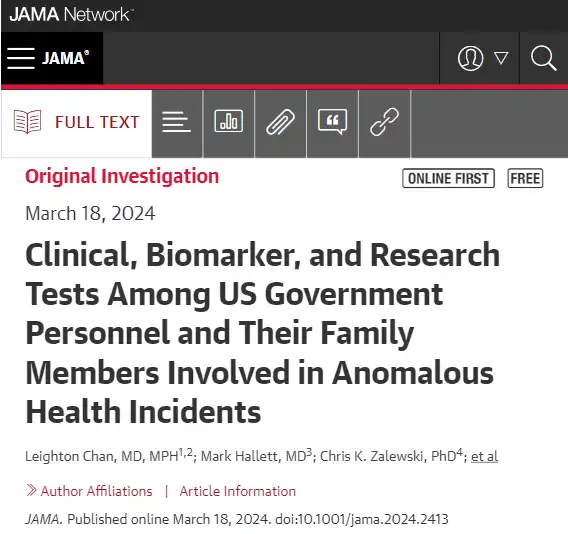Havana Syndrome: A Medical Mystery Still Unraveling
- Normal Liver Cells Found to Promote Cancer Metastasis to the Liver
- Nearly 80% Complete Remission: Breakthrough in ADC Anti-Tumor Treatment
- Vaccination Against Common Diseases May Prevent Dementia!
- New Alzheimer’s Disease (AD) Diagnosis and Staging Criteria
- Breakthrough in Alzheimer’s Disease: New Nasal Spray Halts Cognitive Decline by Targeting Toxic Protein
- Can the Tap Water at the Paris Olympics be Drunk Directly?
Havana Syndrome: A Medical Mystery Still Unraveling
- Should China be held legally responsible for the US’s $18 trillion COVID losses?
- CT Radiation Exposure Linked to Blood Cancer in Children and Adolescents
- FDA has mandated a top-level black box warning for all marketed CAR-T therapies
- Can people with high blood pressure eat peanuts?
- What is the difference between dopamine and dobutamine?
- How long can the patient live after heart stent surgery?
Havana Syndrome: A Medical Mystery Still Unraveling
In 2016, a perplexing situation unfolded at the U.S. embassy in Havana, Cuba. Diplomats and staff began experiencing a cluster of unusual symptoms, including reports of loud noises or vibrations followed by headaches, dizziness, and concerning cognitive issues.
This mysterious illness, dubbed “Havana Syndrome” by the news media, has since affected personnel in various locations worldwide, baffling both the medical community and intelligence agencies.
The recent publication of two research papers in the prestigious Journal of the American Medical Association (JAMA) on March 18, 2024, by scientists at the National Institutes of Health Clinical Center (NIH) sheds some light on the condition. However, significant questions regarding the cause and treatment of Havana Syndrome remain unanswered.

A Puzzling Array of Symptoms
The hallmark symptoms of Havana Syndrome present a complex picture. Individuals report experiencing:
- Sudden, unexplained noises or vibrations, often described as a high-pitched whirring or clicking.
- A sensation of pressure or a popping feeling in the head.
- Headaches, ranging from mild to debilitating.
- Dizziness, vertigo, and problems with balance.
- Difficulty concentrating, memory problems, and impaired vision.
- Sleep disturbances, fatigue, and irritability.
The severity of these symptoms varies considerably, with some individuals experiencing only mild discomfort, while others suffer debilitating effects that significantly impact their daily lives. There is also no clear pattern to the onset of symptoms. Some report experiencing them immediately after the initial noise event, while others develop them days or even weeks later.
Uncertain Cause: A Web of Theories
The lack of a definitive cause for Havana Syndrome has fueled speculation and controversy. Initial theories centered around the possibility of a deliberate attack by a foreign power, potentially using a sonic weapon. However, investigators have found no concrete evidence to support this claim.
Other explanations have been explored by various research groups, including:
-
Directed-energy weapons: The National Academies of Sciences, Engineering, and Medicine released a report in December 2020 suggesting that directed-energy weapons, such as high-powered microwaves, could be a possible cause. However, this theory remains unproven and lacks concrete evidence to explain the full spectrum of symptoms.
-
Chemical exposure: Some researchers posit exposure to certain chemicals, like pesticides or insecticides, used in fumigation practices could be responsible. This theory aligns with the initial outbreak in Havana where the Cuban government implemented a mosquito control program around the time the first cases emerged.
-
Mass psychogenic illness: This theory suggests that the stress and anxiety surrounding the initial reports, coupled with the media attention, could have led some individuals to develop similar symptoms subconsciously. However, the severity and consistency of reported symptoms across diverse locations make this explanation less likely.
The NIH Studies: Findings and Unknowns
The recent NIH studies add valuable data to the ongoing investigation of Havana Syndrome. Researchers evaluated 100 individuals with reported symptoms and compared them to a control group. Their key findings included:
- No evidence of structural brain injury: Advanced MRI scans revealed no detectable abnormalities in the brains of individuals with Havana Syndrome compared to the control group.
- Normal blood tests: Analysis of blood samples did not reveal any specific biomarkers that could be definitively linked to Havana Syndrome.
- Severe symptoms: Despite the lack of physical markers, the study participants reported significant functional impairment affecting their work and daily lives.
These findings offer valuable insights but leave crucial questions unanswered. The absence of a definitive cause for the observed symptoms remains a significant hurdle. Additionally, the lack of physical evidence makes it challenging to develop targeted treatments.
The Road Ahead: Continued Research and Support
The investigation into Havana Syndrome continues. Further research is needed to explore the potential causes, including revisiting existing theories and investigating alternative explanations. Additionally, developing diagnostic tools and effective treatment protocols is crucial for supporting individuals suffering from this debilitating illness.
On a positive note, the recent NIH studies represent a significant step forward. By objectively analyzing the symptoms and experiences of affected individuals, researchers are laying the groundwork for a better understanding of this complex condition.
Furthermore, government agencies, including the U.S. Department of State and the National Institutes of Health, are developing programs to improve case identification, reporting mechanisms, and healthcare support for personnel who may be experiencing symptoms consistent with Havana Syndrome.
Conclusion
Havana Syndrome remains a medical mystery. While the recent NIH studies offer valuable insights, the lack of a definitive cause is a significant hurdle. Continued research, collaboration between medical and scientific communities, and robust support systems for affected individuals are crucial in unraveling this puzzling illness. As the investigation progresses, hopefully, effective treatments can be developed to alleviate the suffering of those experiencing the debilitating symptoms of Havana Syndrome.
Havana Syndrome: A Medical Mystery Still Unraveling
(source:internet, reference only)
Disclaimer of medicaltrend.org
Important Note: The information provided is for informational purposes only and should not be considered as medical advice.



